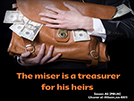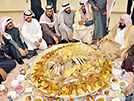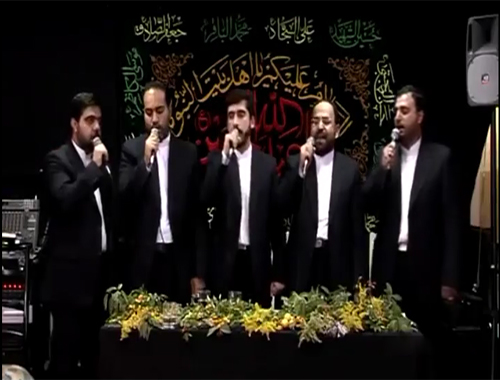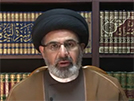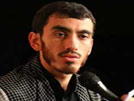The Thirtieth Greater Sin: Not Helping the Oppressed
- Details
- Hits: 2031
Chapter 32
The Thirtieth Greater Sin: Not Helping the Oppressed
--------------------------------------------------------------------------------
The thirtieth sin, which is mentioned as a Greater sin, is ‘not helping the oppressed people’ and ‘not warding off oppression from them’. In the tradition of Amash, Imam Ja’far as-Sadiq (a.s.) says,
“…and not helping the oppressed (is a greater sin).”
To defend the oppressed is to help them ward off evil; not performing such a task is shirking a great duty which Allah has made incumbent upon us.
Imam Musa al-Kadhim (a.s.) says:
“If a person due to some difficulty takes refuge with his Muslim brother but inspite of being capable of helping him does not do so then he has for his own self cut off the Divine help.”
(al-KÄfi)
Allah (S.w.T.) does not help a believer who does not help his brother in faith and leaves him on his own.
Imam as-Sadiq (a.s.) has mentioned that,
“A believer who inspite of being financially capable does not help another believer will be degraded by Allah in this world as well as the Hereafter.”
Similarly Imam Muhammad al-Baqir (a.s.) says:
“None of you should go to a place where a tyrant ruler is oppressing, and killing innocent people, if you are not capable of helping the oppressed. Because in event of a believer being present in such a place it would be his religious duty to help his believing brothers. But if he is not present at that place the obligation will not exist.”
(Safinat’ul-BihÄr)
UmrÅ« bin Qays says, “My cousin and I went to meet Imam Husain (a.s.) when he was surrounded by the army of Yazid (l.a.). Imam (a.s.) conversed with us briefly and then asked,
‘Would you like to help me?’
I replied, ‘I have a family to look after, besides I also have some trusts of some people with me. I don’t know what my end would be and I don’t want that the property of those people, which I have as trust should be destroyed.’ My cousin also offered the same explanation.”
Imam Husain (a.s.) said,
“If you cannot offer your assistance to me you must go far away from this desert so that you may not be able to hear my plaintive cry for help. Because if anyone is to hear our cry for help and does not respond, it would be incumbent upon Allah to throw him in the fire (Hell).”
(Safinat’ul-BihÄr)
Imam Ja’far as-Sadiq (a.s.) says:
“A Jewish scholar was punished with fire maces in his grave with such severity that the flames leapt out from inside. This was because he had prayed without Wuzu and once he was passing by an oppressed person who called for help but he did not respond.”
(Safinat’ul-BihÄr)
The Holy Prophet (S) says:
“It is necessary to help a believer whether he is an oppressor or an oppressed one. If he is an oppressor he should be restrained from oppression and if he is oppressed he should be helped in obtaining his rights. He should not be deserted and left on his own.”
(DÄrus SalÄm)
Imam Ja’far as-Sadiq (a.s.) says:
“He is not a believer who inspite of being capable avoids helping his brother in need; Allah also leaves him on his own and does not help him in this world nor the Hereafter.”
(BihÄr al-AnwÄr)
Imam Muhammad al-Baqir (a.s.) says:
“A person before whom the defects of his Muslim brother are mentioned; and he does not try to remove those defects inspite of being able to do also; then Allah will expose (his defects) in this world as well as the Hereafter.”
From the above tradition and other similar narrations it seems that oppression is not confined to physical harm or monetary difficulty. It is also with regard to the injury to one’s honour and respect. For, the honour of a believer is as precious as his life and wealth. Defiling the honour of a believer is also HarÄm, like usurping his wealth or taking his life. The traditions are emphatic that just as it is necessary to defend the life and property of a believer, it is also incumbent to protect his honour and respect. It is Wajib to assist him in defending his honour.
Imam Ja’far as-Sadiq (a.s.) says:
“If a person tells something (misleading) to a believer by which he intends to make him an evil man and due to this his respect and honour will be destroyed and he will be degraded in the eyes of common people and people will not trust him anymore nor respect him. Then such a person is deprived from the Guardianship of Allah and left for the Shaitan who also does not accept him.”
(al-KÄfi)
The Messenger of Allah (S) says:
“If a person hears of the defects of his believing brother in an assembly and tries to defend him, Allah closes a thousand doors of evil from him in the world and the Hereafter. But if inspite of being capable he does not refrain the one who is speaking about the defects of a believer; his sin will be equal to that of seventy backbiters.”
(Makasib)
Shaykh Ansari says that this sin is equated to that of seventy backbiters probably for the reason that if the one who is mentioning the defects is not restrained he may repeat this act on several other occassions. The Shaykh further says that preventing the backbiter is not sufficient but one should also endeavour to defend the believer from all such accusations and defects. For example if the defects pertain to some worldly matter one should say, “After all he has not committed a sin.” If the defects are with regard to some religious obligation he should try to somehow prove that the accusation is false. As an example, if a believer is said to have omitted prayers one can defend him by suggesting, that may be he had forgotten to offer them. If a believer is accused of being an alcoholic, one can suggest that he must have seen him drinking something else, or as a last resort one can say, “He is after all not a MasÅ«m (infallible). A man is prone to sin sometimes, so instead of back-biting about him you should try to reform him and help him in his difficulties.”
Thus one should make every effort to defend his believing brother from such dishonour. The details of this shall be discussed in the chapter of backbiting.

